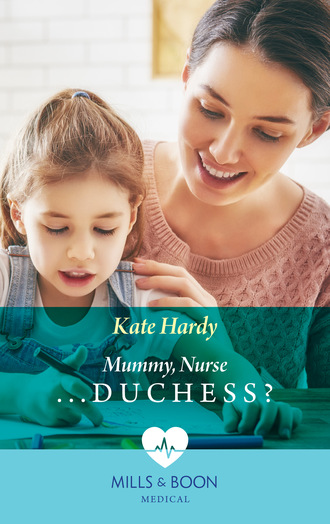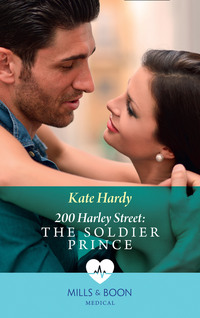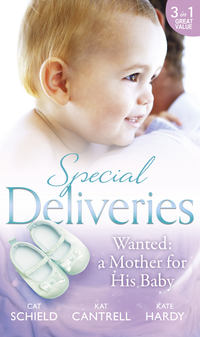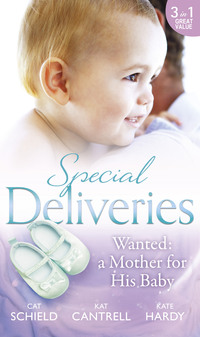
Полная версия
Mummy, Nurse...Duchess?
Colour flooded into her cheeks. ‘How do you know about that?’
‘Kathleen said you have a regular lunch date with her when you’re in.’
‘It gives Julia and Peter—her parents—a chance to get out of here for a few minutes to get some fresh air,’ she said. ‘And it isn’t a problem with Robyn.’
So she had thought he’d disapprove of the way she spent her lunch break. ‘It’s very kind of you,’ he said. Was it just because Penny was a favourite with the staff, or did Rosie maybe have a sister who’d gone through something similar? It was too intrusive to ask. He needed to tread carefully with Rosie or she’d back away from him again.
‘She’s a lovely girl.’
‘Maybe you can tell me about her after work,’ he said. ‘I hear there’s a nice pub across the road. The Frog and...?’ He paused, not remembering the name.
‘Peach,’ she supplied. ‘Sorry. I can’t.’
Can’t or won’t? he wondered. ‘Another previous engagement?’
‘Actually, yes.’
Another patient? He didn’t think she’d tell him. ‘That’s a shame. Some other time.’
But she didn’t suggest a different day or time.
He really ought to just give up.
A couple of his new colleagues had already made it clear that they’d be happy to keep him company if he was lonely. It could be fun to take them up on their offers, as long as they understood that he didn’t do permanent relationships.
Except there was something about Rosie Hobbes that drew him. It wasn’t just that she was one of the few women who didn’t respond to him; his ego could stand the odd rejection. But she intrigued him, and he couldn’t work out why. Was it that she was so different from the women he was used to, women who swooned over him or flattered him because he was a duke? Or was it something deeper?
It had been a long time since someone had intrigued him like this. Something more than just brief sexual attraction. And that in himself made him want to explore it further—to understand what made Rosie tick, and also why he felt this weird pull towards her.
Tomorrow, he thought. He’d try talking to her again tomorrow.
* * *
Rosie was five minutes late from her shift, and the twins were already waiting for her with their backpacks on. They were singing something with Nina, one of the nursery school assistants, who was clearly teaching them actions to go with the song. Rosie felt a rush of love for them. Her twins were so different: Lexi, bouncy and confident, with a mop of blonde curls that reminded Rosie a little too much of Michael, and yet other than that she was the double of Rosie at that age. And Freddie, quieter and a little shy, with the same curls as his sister except mid-brown instead of golden, and her own bright blue eyes; thankfully he hadn’t turned out to be Michael’s double. Rosie was determined that her children were going to know nothing but love and happiness for the rest of their lives—and she really hoped that they wouldn’t remember what life had been like when their father was around.
‘Mummy!’ The second they saw her, Lexi and Freddie rushed over to her and flung their arms round her.
‘My lovely Lexi and Freddie.’ Rosie felt as if she could breathe properly again, now she was back with her babies. Even though she loved her job and she knew the twins were well looked after in the nursery school attached to the hospital, she was much happier with them than she was away from them.
‘So what have you been doing today?’ she asked, holding one hand each as they walked out of the hospital.
‘We singed.’ Lexi demonstrated the first verse of ‘The Wheels on the Bus,’ completely out of tune and at full volume.
‘That’s lovely, darling,’ Rosie said.
‘And we had Play-Doh,’ Freddie added. ‘I maked a doggie. A plurple one.’
Rosie hid a smile at his adorable mispronunciation. ‘Beautiful,’ she said. She knew how badly her son wanted a dog of their own, but it just wasn’t possible with their current lifestyle. It wouldn’t be fair to leave a dog alone all day; and she couldn’t leave the twins alone while she took the dog for the kind of long walk it would need after being cooped up all day, and which the twins would be too tired to do after a day at nursery school.
‘We had cookies,’ Lexie said.
‘Chocolate ones. Nina maked them. They were crum—crum—’ Freddie added, frowning when he couldn’t quite remember the new word.
Crumbly? Or maybe a longer word. ‘Nina made them,’ Rosie corrected gently, ‘and they were scrumptious, yes?’ she guessed.
‘Crumshus!’ Lexie crowed. ‘That’s right.’
The twins chattered all the way on the short Tube journey and then the ten-minute walk home. They were still chattering when Rosie cooked their tea, and gave them a bath. Although Freddie was a little on the shy side with strangers, he strove to match his more confident sister at home.
And Rosie was happy to let them chatter and laugh. She’d worried every day for the last year that their experience with Michael’s associate had scarred them; but hopefully they’d been too young to realise quite what was going on and how terrified their mother had been.
Once the twins were in bed, she curled up on the sofa with a cup of tea and a puzzle magazine. A year ago, she would never have believed she could be this relaxed again. Some things hadn’t changed; she was still the one who did everything for the twins and did all the cooking and cleaning. But she no longer had to deal with Michael’s mercurial mood swings, his scorn and his contempt, and that made all the difference. Being a single parent was hard, but she had the best family and good friends to support her. And she didn’t have Michael to undermine her confidence all the time.
Various friends had hinted that she ought to start dating again. Part of Rosie missed the closeness of having a partner, someone to cuddle into at stupid o’clock in the morning when she woke from a bad dream. But she’d lost her trust in relationships. Good ones existed, she knew; she’d seen it with her parents and with friends. But Rosie herself had got it so badly wrong with Michael that she didn’t trust her judgement any more. Trusting another man, after the mess of her marriage, would be hard. Too hard. Plus, she had the twins to consider. So she’d become good at turning the conversation to a different subject rather than disappointing her well-meaning friends and family, and any direct suggestions of a date were firmly met with ‘Sorry, no.’
Just as she’d rebuffed Leo Marchetti this evening, when he’d suggested that they went for a drink in the pub over the road after work.
Had she been too hard on him?
OK, so the guy was a charmer, something that set all her inner alarm bells clanging. On the other hand, today had been Leo’s first day at Paddington’s. The only person he knew at the hospital was Robyn, so he was probably feeling a bit lost. Guilt nagged at her. She’d been pretty abrupt with him, and it wasn’t his fault he’d been born with a Y chromosome and was full of charm. She needed to lighten up. Maybe she’d suggest having lunch with him tomorrow.
But she’d make it clear that lunch meant lunch only. She wasn’t in a position to offer anything more. And, if she was honest with herself, it’d be a long time before she was ready to trust anyone with anything more. If ever.
CHAPTER TWO
‘YOU’RE IN CLINIC with Rosie, this morning,’ Kathleen said to Leo with a smile when he walked onto the ward. ‘It’s the allergy and immunology clinic.’
‘Great. Just point me in the right direction,’ he said, smiling back.
Hopefully Rosie would be less prickly with him today. And if they could establish a decent working relationship, then he might be able to work out why she drew him so much, and he could deal with it the way he always dealt with things. With a charming smile and a little extra distance.
He looked through the files while he waited for Rosie to turn up.
‘Sorry, sorry,’ she said, rushing in. ‘I was held up this morning.’
‘You’re not late,’ he pointed out, though he was pleased that she didn’t seem quite so defensive with him today.
‘No, but...’ She flapped a dismissive hand. ‘Has anyone told you about today’s clinic?’
‘Kathleen said it was the allergy and immunology clinic, so I’m assuming some of these patients have been coming here for a while.’
‘They have,’ she confirmed.
‘Then at least they have some continuity with you,’ he said with a smile. ‘Are you happy to call our first patient in?’
Their first patient was an eighteen-month-old girl, Gemma Chandler. ‘The doctor asked me last time to keep a food diary with a symptom chart,’ her mother said.
‘May I see them, please?’ Leo asked.
She took it out of her bag and handed it to him; he read the document carefully. ‘So she tends to get tummy pain, wind and diarrhoea, and sometimes her tummy feels bloated to you.’
Mrs Chandler nodded. ‘And sometimes she’s come out in a rash on her face and it’s been itchy. It’s really hard to stop her scratching it.’
‘There are some lotions that help with the itch and last a bit longer than calamine lotion,’ Leo said. ‘I can write you a prescription for that. And you’ve done a really good job on the diary—I can see a very clear link between what she’s eating and her symptoms.’
‘It’s dairy, isn’t it?’ Mrs Chandler bit her lip. ‘I looked it up on the Internet.’
‘The Internet’s useful,’ Leo said, ‘but there are also a lot of scare stories out there and a lot of wrong information, so I’m glad you came to see us as well. Yes, I think it’s an allergy to dairy—more specifically lactose intolerance. What that means is that Gemma’s body doesn’t have enough of the enzyme lactase to deal with any lactose in the body—that’s the sugar in milk. What I think we need to do is try an exclusion diet for the next fortnight to confirm it. So that means I’d like you to check the labels for everything and make sure there’s no milk in anything she eats or drinks. If you can keep doing the food diary and symptom chart, we can review everything in a fortnight.’
‘We can give you some information leaflets about substitutes and vitamin supplements,’ Rosie said. ‘You can give Gemma rice milk instead of cow’s milk, and sunflower margarine instead of butter.’
‘Gemma’s meant to be going to her cousin’s birthday party, next week.’ Mrs Chandler sighed. ‘So that’s going to be difficult—she won’t be able to have any of the sandwiches or any of the cake, will she?’
‘You could do a special packed lunch for her,’ Rosie suggested. ‘And I’m sure if you tell your family and friends, they’ll help you work things out.’ She handed Mrs Chandler a leaflet. ‘Eating out with a toddler can be tricky enough, but having to take a food allergy into account can make it seem overwhelming.’
Was she talking from personal experience? Leo wondered. Or was it because she’d worked with so many patients in the allergy clinic? Not that he could ask without being intrusive, and he didn’t want to give Rosie any excuse to back away from him.
‘There are some good websites on the back of the leaflet for helping you to find places where they offer dairy-free options,’ Rosie said.
‘Thank you,’ Mrs Chandler said.
‘And we’ll see you and Gemma again in a fortnight to see how things are. If her symptoms are better,’ Leo said, ‘I’ll refer you to a dietitian so you can get proper support with a long-term exclusion diet. And in the meantime, if you have any questions or you’re worried about anything, give us a call.’
Mrs Chandler nodded. ‘Will she ever grow out of it? I’ve heard that some children do.’
‘We really can’t tell, right now,’ Leo admitted. ‘I think this is something we’ll need to take one step at a time.’
Once the Chandlers had gone, while Leo was writing up the case notes, Rosie got out the next patient’s notes. ‘Sammy Kennedy. He’s a sweetheart.’
‘What’s he seeing us about?’ Leo asked.
‘He has CAPS.’
Cryopyrin-Associate Periodic Syndrome. Leo knew it was an auto-inflammation disorder where the immune system was overactive and caused prolonged periods of inflammation, rather than the body producing antibodies against itself. ‘That’s rare,’ he said. ‘About one in a million. Actually, I’ve only seen one case before.’
‘Sammy’s my only case, too,’ she said. ‘Most patients with CAPS in the UK have Muckle-Wells Syndrome, and that’s the variant Sammy has.’
‘Tell me about him,’ Leo invited. Sure, he could read the file, but this way he got the chance to interact with Rosie. And he liked how quick her mind was.
‘He’s eight years old and he’s been coming here for nearly a year. He comes to clinic with his mum roughly every eight weeks. We check his knees and ankles and do bloods to measure the inflammation levels, and then we give him an injection of the drug that keeps his MWS under control,’ she explained.
‘That’s the drug that blocks interleukin 1β, yes?’ he checked.
‘Yes,’ she confirmed. ‘The treatment’s still new enough that we don’t know the long-term effects, but we’re hoping that it will stop more severe problems developing as he grows older.’
‘Such as deafness?’
‘Exactly,’ she said. ‘Are you ready to see him now?’
He nodded. ‘Absolutely.’
Rosie went out into the reception area and came back with Sammy and his mother.
Leo smiled at them. ‘Hello. I’m Dr Marchetti—you can call me Dr Leo, if you prefer. And you’re Sammy?’
The little boy nodded.
‘Tell me how you’re doing, Sammy,’ Leo invited.
‘Sometimes I have good days, and sometimes I get bad days,’ Sammy said, shrugging.
‘OK. What happens when you have a bad day?’
‘Mum says it’s a flare-up. It affects my tummy, my knees and my head. I get a rash, and it’s always at night.’ Sammy grimaced. ‘Show him, Mum.’
Mrs Kennedy took out her phone and showed them a picture of the nettle rash on Sammy’s stomach.
‘How often do you get flare-ups?’ Leo asked.
‘Every couple of weeks. But it’s not been so bad, lately.’
‘Are you happy for us to examine you?’ Leo asked.
Sammy gave him a rueful smile. ‘I know the drill. You ask me questions, look me over, take blood and then give me the injections.’
‘That’s a pretty good summary,’ Leo said, smiling back.
‘I don’t like the injections,’ Sammy said. ‘They sting and they make my skin sore. But I guess it’s better than the rash.’
‘A lot of people don’t like injections, so you’re not alone there,’ Leo said. ‘Is there anything you’d like to add or ask, Mrs Kennedy?’
‘We’re getting to be old hands at this, now,’ she said. ‘It’s fine.’
Between them, Rosie and Leo examined Sammy, and she took a blood sample. Then Leo administered the drug.
Sammy flinched.
‘I’m sorry it stings,’ Leo said.
‘It’s all right,’ Sammy said, clearly trying to be brave.
‘I have something for you,’ Rosie said. ‘That is... Unless you’re too old to have a lolly for being brave?’
Sammy grinned when he saw the red and white lolly. ‘As if I’m going to turn down a lolly. Especially when it’s in my team’s colours!’
‘You’re a football fan?’ Leo asked.
Sammy nodded. ‘I’d like to be a footballer, but my CAPS is going to get in the way a bit, and I don’t want to let my team down. But I guess I could be a scientist when I grow up and invent a needle that doesn’t hurt when you give someone an injection.’
‘That,’ Leo said, ‘is a brilliant idea, and I think it deserves something extra.’ He produced another red and white lolly. ‘Don’t tell Rosie I raided her lolly jar,’ he said in a stage whisper.
Sammy laughed. ‘See you in a couple of months, Dr Leo.’
‘See you,’ Leo returned with a smile.
When the Kennedys had left, he looked at Rosie. ‘Sammy’s a nice kid.’
‘He is,’ she agreed. Then she paused. ‘I was a bit abrupt with you yesterday. Sorry. So, um, I was wondering, would you like to have lunch with me today? Just as colleagues,’ she added hastily.
Again he glanced at her left hand and saw no sign of a wedding ring. Did she really mean having lunch together just as colleagues, or did she feel the same pull of attraction towards him that he felt towards her?
It might explain why she’d been so prickly yesterday; she might be just as spooked by her reaction to him as he was by his reaction to her. Though quite where they went from here, he had no idea. What he’d seen of Rosie so far told him that she was very professional—straight-talking, yet deeply caring towards her patients. He liked that. A lot.
But he also had the strongest impression that Rosie Hobbes wasn’t the sort to have a casual fling. Which meant she was off limits, because he wasn’t looking for something serious and long-term.
‘Just as colleagues,’ he agreed.
Once they’d seen the last patient at the clinic, they headed for the canteen. Leo noted that she chose a healthy salad and a mug of green tea—not that his own sandwich and coffee were that unhealthy. But Rosie clearly looked after her health.
‘So how are you settling in?’ she asked when they’d found a table.
‘To the hospital or to London?’
‘Both, I guess.’
‘Fine,’ he said. ‘The staff all seem really nice here, and I trained in London so I feel pretty much at home in the city.’
‘That’s good.’
There was a slightly awkward silence, as if she didn’t really know what to say to him next. It might be easier to keep the conversation going, Leo thought, if he asked her to tell him more about Paddington Children’s Hospital and its predicament.
‘Obviously Robyn told me about the Board of Directors and their plans, when she asked me to come and work here,’ he said, ‘so I understand why we’re so short-staffed at the moment. But I gather there was a fire at a local school which made things a bit trickier?’
She nodded. ‘It was about a month ago. The fire started in the art department, apparently. I’m not sure if it was a broken heater or something that caused the initial fire, but some of the paper caught light.’
‘And everything else in an art department tends to be on the flammable side,’ he said.
‘Exactly. It was pretty scary. The school did what they could to get the kids out, but we were overflowing with patients suffering from everything from smoke inhalation to burns. Simon Bennett had severe facial burns; he’s due for some reconstruction surgery, so he’s in and out for check-ups at the moment, poor lamb.’ She winced. ‘And then there’s little Ryan.’
‘Ryan?’ he asked.
‘Ryan Walker. He was one of the last to be rescued. The poor little lad was hiding in a cupboard. He heard the firemen when they’d put the fire out in his classroom and came out of the cupboard, but then a beam snapped and hit him on the head.’
‘He’s lucky to be alive, then,’ Leo said.
She nodded. ‘But the poor little mite was very badly hurt. He had a craniectomy the other day. Right now he’s under sedation and has a helmet on to protect him until the surgical team can replace the skull flap.’
‘Poor kid,’ Leo said.
‘I know. But just think—if we’d been moved to Riverside,’ she said softly, ‘he wouldn’t have made it. And the same’s true for Simon.’
‘So you’re fighting for the hospital to be saved.’
‘Victoria’s set up a committee—actually, Quinn, Simon’s foster mum, is on the committee. We’ve got protestors outside the gates twenty-four-seven. Though you already know that,’ she said. ‘You were photographed with them yesterday.’
And the photographs had since been used all round the globe. ‘Might as well make the press do something useful,’ he said dryly.
‘Do the press hound you all the time?’ she asked.
‘Off and on. It depends if it’s a slow news day—but they’re rather more interested in the Duke than in the doctor.’ He paused. ‘Is that why you said about a castle yesterday?’
‘Castle?’ She frowned for a moment, and then her expression cleared. ‘It’s what all the staff call the hospital, because of the turrets.’
‘Oh.’
She stared at him, looking slightly shocked. ‘Hang on. You thought I was having a dig about you being a duke?’
‘We didn’t exactly get off on the right foot together yesterday,’ he pointed out.
‘No—and I guess I was a bit rude to you. Sorry.’
He appreciated the apology, though he noticed she didn’t give him any explanation about why she’d been so abrupt with him.
‘For the record,’ he said, ‘I did grow up in a castle. And I can tell you it’s not all it’s cracked up to be. For starters, castles tend to be draughty and full of damp.’
‘And full of suits of armour?’
He smiled. ‘We do have an armoury, yes. And I have been thinking about opening the place to the public.’ Which might give his mother something more immediate to concentrate on, instead of when her son was going to make a suitable marriage and produce an heir to the dukedom.
‘But I really don’t understand,’ she said, ‘why a duke would want to be a doctor. I mean, don’t you have to do loads of stuff for the dukedom?’
‘I delegate a fair bit of it,’ he said, ‘and I have good staff.’
‘Which again makes you different from any other doctor I’ve met.’
He wondered: was that different good, or different bad?
‘I don’t know anyone who has staff,’ she said. ‘Anyone at all. In fact, I don’t even know anyone who hires a cleaner.’
‘Guilty there, too,’ he said. ‘Obviously I know how to use a vacuum cleaner, but there are a lot of other things I’d much rather do with my free time.’
She said nothing.
‘I want to be a doctor,’ he said softly, ‘because I want to make a real difference in the world.’
‘Can’t you do that as a duke?’
‘Not in the same way. I don’t want to just throw money at things. It’s not enough. I want to make the difference myself.’
‘From the way you talk,’ she said, ‘anyone would think you don’t actually like being a duke.’
He didn’t.
‘Let’s just say it’s not what everyone thinks it would be like—and plenty of people see the title first and not the man.’
She reached out and squeezed his hand in a gesture of sympathy. His hand tingled where her skin touched his, shocking him; he was used to being attracted to women, but he wasn’t used to having such a strong reaction to someone and he wasn’t quite sure how to deal with it.
She looked as shocked as he felt, as if she’d experienced the same unexpected pull. ‘Sorry. I didn’t...’ Her words trailed off.
Didn’t what? Didn’t mean to touch him? Or didn’t expect to feel that strong a physical reaction?
He had the feeling that she’d find an excuse to run if he called her on it. ‘No need to apologise. It’s nice that you understand,’ he said. ‘So have you been working at this castle very long?’
‘For nearly a year,’ she said.
‘Where were you before?’
‘The other side of London, where I trained.’
He noticed that she hadn’t actually said where. Why was so she cagey about her past?
He’d back off, for now. Until he’d got his head round this weird reaction to her and had made sense of it. And then maybe he’d be able to work out what he wanted to do about it. About her.
* * *
On Wednesday lunchtime, Rosie disappeared, and Leo remembered what Kathleen had said to him: Rosie read to Penny every other day, when she was in. Not quite able to keep himself away, he found himself in the corridor outside Penny’s room. Rosie’s voice was clear and measured as she read the story, and every so often he could hear a soft giggle of delight from Penny.
‘Rosie’s so lovely with her,’ a voice said beside him.
He looked round; the woman standing next to him looked so much like Penny that there was only one person she could be. ‘You’re Penny’s mum, yes?’
‘Julia.’
‘Dr Marchetti,’ he said, holding out his hand to shake hers. ‘Although your daughter isn’t one of my patients because I’m not a heart specialist, I work with Rosie, and Rosie told me all about Penny.’
‘Rosie’s such a lovely woman. So patient. And it’s so kind of her to read to Penny in her lunch break.’












